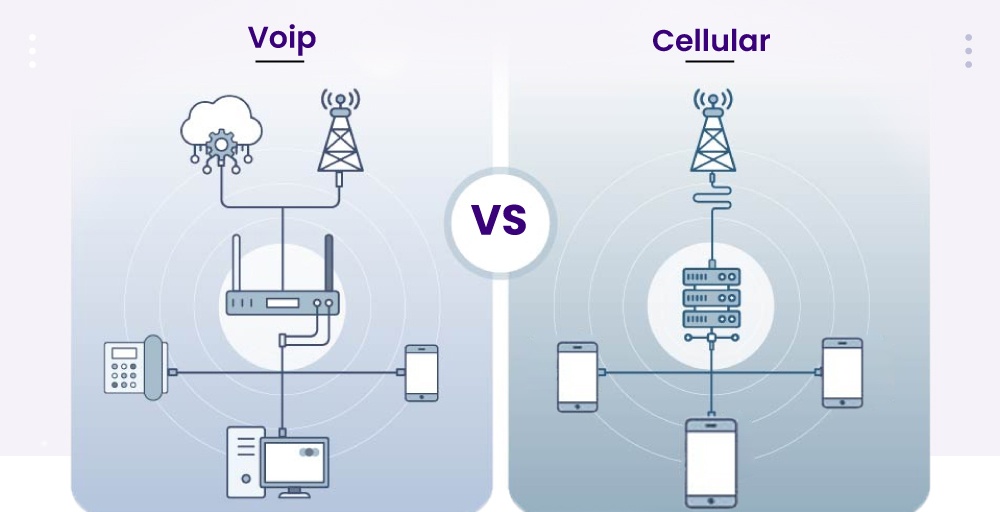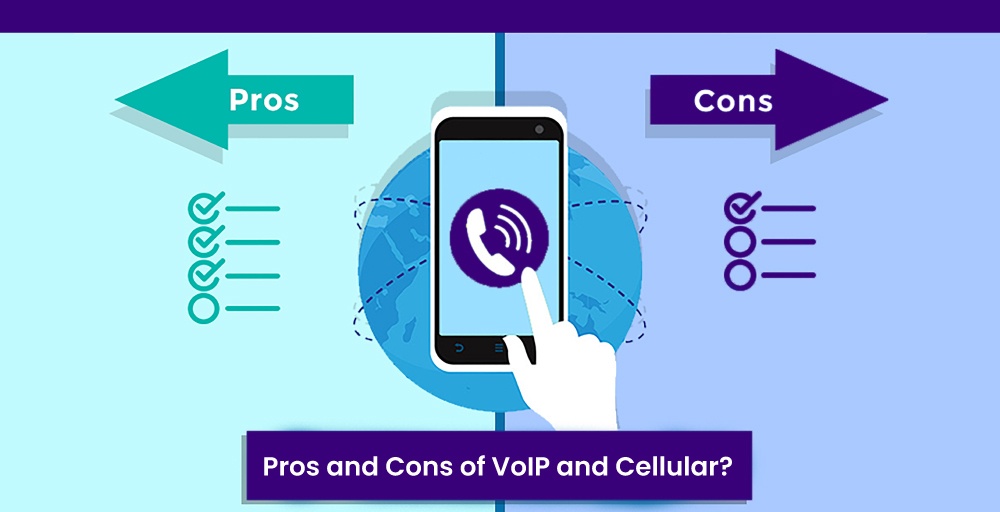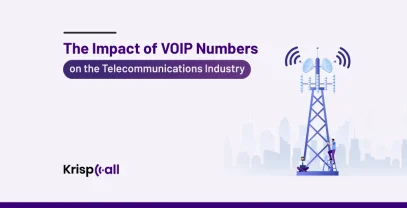Feeling lost😥 in choosing between VoIP calls over WiFi and traditional call service? Don’t stress; both can be amazing, depending on your needs.
Voice Over Internet Protocol (VoIP) allows you to call anyone and anywhere through a mobile phone using an internet connection. To simplify it, Skype and WhatsApp are the best instances of VoIP.
On the other hand, cellular refers to the mobile network provided by mobile carriers to make and receive calls between mobile devices. You need to be in a cellular tower coverage area to make calls.
Are you still confused? So, let’s discuss the differences, features, benefits, and limitations of these two communication systems.
🙋♀️ Key Points
- VoIP (voice-over-Internet protocol) connection uses an internet connection to make and receive calls, while a cellular network uses cellular towers.
- VoIP is cheaper than cellular networks, especially for international calls.
- Cellular networks have wider coverage, enabling users to make calls while on the go.
- VoIP provides an extensive range of features, such as call recording, conferencing, and more.
VoIP Vs Cellular: What is the Difference?
The major difference between VoIP and Cellular is that VoIP uses an internet connection like IP Telephony while Cellular phones connect to cellular towers via radio waves to make and receive calls.

In addition, VoIP is advantageous for those seeking cost, savings, flexibility, and advanced features, whereas cellular services are preferable for those requiring extensive mobility and reliable coverage.
See more about the difference between VoIP and Vellular in this comparison table.
| Feature | VoIP | Cellular |
| Technology | Uses internet connection (Wi-Fi or data) | Uses cellular network towers |
| Cost | Generally cheaper, especially for frequent calls | Can be cheaper with bundled plans, but per-minute rates can be higher |
| Coverage | Limited to areas with Wi-Fi or data coverage | Wide coverage, even in remote areas |
| Call Quality | Generally excellent with a strong internet connection | Can vary depending on signal strength and network congestion |
| Reliability | Reliant on Internet stability | More reliable, even during outages (may depend on location) |
| Security | Requires security measures for internet calls | Generally secure, but interceptions are possible |
| Mobility | Limited to Wi-Fi or data coverage areas | More mobile, usable almost anywhere |
| Features | Often includes features like call recording, transcription, and video conferencing | May have some features like voicemail and caller ID, but advanced features are less common |
| Scalability | Easily scalable for growing businesses | Scaling may require plan changes and additional expenses |
| Ideal for | Remote workers, cost-conscious businesses, frequent callers | Businesses with mobile employees, users needing wide coverage |
What are the pros & cons of VoIP and Cellular?
Firstly, weighing the advantages, VoIP offers advanced features, reliable security, scalability, and flexibility at an affordable cost. It allows you to call from any device, such as a desktop or PC, until you are connected to an internet connection. You don’t need a cell phone to make a phone call.

As it heavily relies on an internet connection, it is possible to have disruptions in your call when internet speeds are insufficient. Further, it’s not as effective as cellular networks if you move constantly from one place to another.
Using cellular technology has several benefits, such as increased coverage and mobility. Moreover, it is convenient for emergency services as it does not require WiFi or hotspots to function. On top of that, this system delivers reliable communication systems in most regions, allowing users to maintain continuous connectivity.
Even though Cellular covers a more expansive area, you need to be in a range of cellular towers for uninterrupted calls. In comparison with VoIP, it costs more due to extensive data usage, especially for international calls. In addition, cellular networks offer fewer built-in features.
VoIP Vs Cellular: Technology
Voice over Internet Protocol enables voice calls and multimedia sessions to be transmitted over the Internet. This technology converts analog audio signals into small digital data packets. Later, it was re-converted into audio at the receiving end. To make a call, an internet connection-supported device or specialized VoIP phone is required.
Cellular services mainly rely on cellular towers to transmit voice calls between two mobile phones. When a phone call is made, the signal is beamed to the nearest cellular tower, and then the call is routed through a local base station to its destination. Cellphones are connected to the nearest cellular tower via radio waves.
VoIP Vs Cellular: Coverage
In comparison, cellular networks have a broader coverage area than VoIP due to a vast network of cell towers. On the other hand, VoIP mainly relies on the internet connection, which limits its coverage area.
VoIP might also not be available in remote areas due to the lack of essential internet infrastructure.
In terms of reliability, Cellular typically exhibits higher stability than VoIP because they are specifically designed to prioritize emergency calls. And VoIP can be inclined to issues related to internet connection speed and stability.
However, advancements in technology have enhanced VoIP reliability considerably. Overall, cellular networks offer better coverage and reliability.
VoIP Vs Cellular: Cost
In terms of comparison between VoIP and Cellular networks, VoIP simply offers the services at a lower cost. On the other hand, Cellular uses more data, which results in extra costs for users.
VoIP
- Lower monthly fees: VoIP typically offers lower monthly fees than cellular networks, especially for frequent callers. This is because VoIP utilizes existing infrastructure, eliminating the need for phone lines and network maintenance. Therefore, it is a cost-effective option for businesses and individuals.
- Unlimited calling plans: Most VoIP providers offer unlimited calling plans to their users, enabling them to make unlimited calls within certain regions or even globally. This can be a considerable cost saver for businesses and individuals.
- Free international calls: Some VoIP providers offer a free international call or charge certain amounts. This can be an advantage for users who frequently communicate internationally.
Cellular
- Higher monthly fees: Cellular typically has a higher monthly fee compared to VoIP, especially for unlimited talk and data. Furthermore, additional charges can add up instantly if you exceed the allotted data or minutes.
- Limited talk time and data plan: Cellular network service generally comes with limited talk time and data. That means it is inconvenient for heavy users. Further, exceeding the talk time or data results in additional charges.
- Additional charges for international calling: Cellular networks charge additional charges for international calls, which is costly. Therefore, cellular is inconvenient for those who frequently communicate internationally.
VoIP Vs Cellular: Features and functionality
Voice over Internet Protocol and cellular services are different in terms of features and functionality.
VoIP
- Advanced calling features: Go beyond the basic call function with advanced calling features such as call forwarding, conferencing, voicemail-to-email, and more. Using VoIP, you can manage your calls like a pro and boost efficiency.
- Integration with other communication tools: In addition to offering advanced features, VoIP also enables integration with other communication tools. Seamlessly connect your VoIP system with communication tools like email, instant messaging, and video conferencing tools.
- Flexibility in customization and scalability: VoIP customization and scalability features allow businesses to tailor their communication system to their specific needs.
Cellular
- Standard calling features (call waiting, caller ID): Cellular offers standard calling features such as call waiting and caller ID, which ensure you never miss an important call.
- Limited integration with other tools: Some cellular plans allow only limited integration with other tools, such as email and messaging apps. This makes it difficult for users to collaborate and communicate efficiently.
- Limited customization options: Cellular service provides limited customization options, such as limited control over call forwarding, voicemail settings, and call screening.
VoIP Vs Cellular: Privacy and security
When it comes to phone calls, your privacy matters. So, let’s dive into the security battleground of VoIP and cellular:
VoIP
- Vulnerability to hacking and eavesdropping: As VoIP data is transmitted over the internet, it can be susceptible to hacking and eavesdropping if the data is not properly secured.
- Encryption can strengthen security: Encrypted VoIP phone systems are required to enhance the security of VoIP calls. This makes it more difficult for an unauthorized person to intercept the call and decipher the communication.
- Potential for data leakages in case of service outages: In case of service outages, there is a possibility of data leakages, increasing the risk of data leaks and potentially revealing information like call logs and recordings.
Cellular
- More secure compared to VoIP: Cellular networks are typically considered more secure than VoIP because of their built-in network security measures and encryption protocols.
- Networks are constantly monitored for vulnerabilities: Cellular networks are constantly monitored, which enhances overall security and patches security holes. This helps to minimize the risk of potential data leaks.
- Calls protected by cellular encryption standards: Each call that is made by cellular networks is protected by cellular encryption standards, which adds an extra layer of security to the communication.
VoIP Vs Cellular: Mobility & Flexibility
Regarding mobility and flexibility, VoIP and Cellular have their advantages and drawbacks. While VoIP is better in flexibility, cellular services stand out in mobility.
VoIP
- Requires internet connection: VoIP mainly depends on an internet connection to make and receive calls. If the internet connection is unstable, you may face interruption in communication that can affect your business.
- Limited to locations with Wi-Fi or data coverage: Voice-over Internet Protocol services are limited to areas with WiFi or data coverage. This can be a disadvantage for users who need to make calls in remote areas.
- Can be used on various devices (smartphones, tablets, computers): The most beneficial point of VoIP is that it offers flexibility for users to make and receive calls from any device, such as smartphones, tablets, and computers.
Cellular
- Reliable connectivity almost anywhere: With wider coverage, Cellular networks offer reliable connectivity almost everywhere, as long as cell towers cover that area. Cellular signals reach farther than a determined explorer, ensuring you’re never out of touch.
- Independent of Wi-Fi availability: Users don’t need to hunt for WiFi or hotspots, as Cellular networks stand out to connect your calls anytime. Cellular networks don’t need WiFi to make and receive calls.
- Best-suited for on-the-go communication: Cellular networks are well-suited for on-the-go communication, as they offer wider coverage and consistent connectivity.
VoIP Vs Cellular: Which is More Reliable?
VoIP
- Relies on an Internet connection: VoIP highly relies on a stable Internet connection to make and receive calls. However, unstable internet connections may interrupt the conversation or disconnect you from the call.
- Susceptible to service outages and disruptions: VoIP disruptions occur due to power outages, internet infrastructure issues, or even overloaded networks. When service providers are working to reduce these vulnerabilities, it can leave you disconnected at critical moments.
Cellular
- Consistent connectivity in most areas: Cell towers are everywhere, which helps you make and receive calls from anywhere to anyone. Moreover, it offers reliable connectivity in a wide range of geographic locations.
- Redundancies are in place to minimize service disruptions: Cellular networks are designed with redundancies to minimize service disruptions. It makes cellular networks more reliable in emergencies.
VoIP Vs Cellular: Future Trends & Predictions
The communication landscape constantly evolves as time passes, and the comparison between VoIP and cellular for your call isn’t over. So, let’s explore the emerging technologies shaking things up and the impact of 5G on both communication systems.
1. Emerging technologies in VoIP and Cellular
As the world has made significant leaps in advanced technology over time, drastic changes have been made in communication systems.
Many new technologies have emerged as time passes. Still, some of the notable emerging technologies in VoIP and Cellular include cloud computing, unified communications, artificial intelligence enhancements, internet of things synergy, improved security, and infrastructure upgrades for VoIP.
Other than that, the emergence of 5G networks has affected both types of communication.
2. Impact of 5G on both technologies
With the rise of 5G, its impact on VoIP and cellular networks is expected to provide more reliable connections, internet speeds, high-definition audio and video, and enhanced communication capabilities.
For VoIP, 5G helps improve video conferencing, supports higher-resolution videos, and reduces latency. For Cellular, 5G offers faster connectivity, lower latency, improved quality, and the ability to connect to a wide spectrum of devices.
Upgrade your cellular phone to a VoIP phone with KrispCall
If you are tired of sky-high bills and limited features, it’s time to switch and unleash the power of VoIP calling with KrispCall.
Don’t get confused; KrispCall isn’t just another VoIP provider; it is your gateway to a smarter, more efficient, and cost-effective communication experience. KrispCall provides rich features such as call management and CRM system integrations.
With KrispCall, you can enjoy all the advantages of VoIP without having to invest in costly hardware or change your current phone number. KrispCall provides a user-friendly interface that helps you to improve your collaboration with your team. Furthermore, KrispCall offers you enhanced security to protect your data.
Besides that, here are the five key points to upgrade your cellular phone to a VoIP phone with KrispCall.
- Seamlessly integrate with popular CRM systems to improve customer interactions and streamline workflows.
- Facilitate collaboration by allowing multiple users with role-based access control for enhanced security.
- Can get access to all features through the mobile app, enabling efficient communication on the go.
- Get international numbers for national, local, shortcode, and toll-free numbers from over 100 countries.
- Manage and monitor all business calls, voicemails, and recorded conversations in one place for streamlined operations.
Ready to make the switch? Visit KrispCall today, book a free demo, and experience the future of communication!
VoIP Vs Cellular: Which one is better for Your Business?
It can be tricky for businesses to select between VoIP and Cellular networks, as both of them have their own advantages.
However, when choosing between two technologies, businesses have to look out for their specific needs prior to making any decisions. Therefore, companies need to acknowledge their size, employee travel, and security.
VoIP is mainly ideal for businesses where team members work remotely or in multiple locations because it enables you to connect with them wherever they are located. Furthermore, it is also suitable for businesses that are seeking a cost-effective communication system with advanced features.
On the other hand, a Cellular network is ideal for businesses that require mobility, widespread coverage, and the ability to connect to a wide spectrum of devices. It plays a significant role in allowing employees to stay connected and collaborate efficiently while on the go.
Overall, the decision between VoIP and cellular technology solely depends on your business’s unique needs, priorities, and the particular use cases of your communication requirements. But, keeping the digital world in mind, VoIp is better for every business in this generation.
Conclusion
The world of communication has drastically changed from telephone landlines to cellular networks. And now VoIP has entered the market.
Therefore, the communication smackdown has been started between VoIP and Cellular networks. But it’s not over till now due to their own different advantages. While VoIP stands out as cost-effectiveness, scalability, and feature diversity, Cellular comes out as unwavering connectivity and unmatched mobility, assuring your team stays connected even in the remotest corners of the ring.
For that reason, it’s also hard for businesses to choose between these two technologies. However, it’s better to have VoIP for your business, as per the current communication needs.
Choose KrispCall as your VoIP provider to get access to advanced features. Book a free demo now.
FAQ
Can I use my phone as VoIP?
Yes, you just need an internet connection, a VoIP provider, and a compatible device. You can install a VoIP app on your smartphone to make and receive calls using WiFI or cellular data.
Do VoIP mobile phones work without the internet?
It’s not possible for VoIP mobile phones to work without the internet, as it requires an internet connection to function.
Which technology is best for making international calls?
When it comes to making international calls, VoIP stands out as best due to its cost-effectiveness and flexibility.
What features are available with VoIP that are not available with cellular?
There are several features that are available with VoIP and not available with cellular, such as flexibility, advanced calling features, integration with other devices, and a centralized platform.





